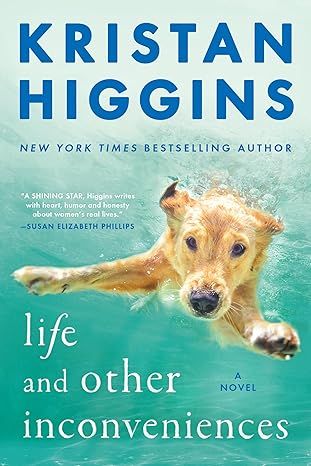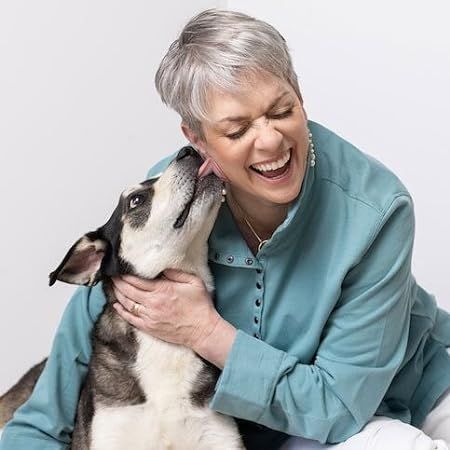Life and Other Inconveniences
4.6
-
2,879 ratings
“A heart-wrenching page-turner told with warmth and humor.”—People Magazine (Pick of the Week) “A rich testament to the power of second chances.”—Women’s World
A Publishers Weekly and USA Today Bestseller!
From the New York Times bestselling author of Good Luck with That comes a new novel about a blue-blood grandmother and her black-sheep granddaughter who discover they are truly two sides of the same coin.
Emma London never thought she had anything in common with her grandmother Genevieve London. The regal old woman came from wealthy and bluest-blood New England stock, but that didn't protect her from life's cruelest blows: the disappearance of Genevieve's young son, followed by the premature death of her husband. But Genevieve rose from those ashes of grief and built a fashion empire that was respected the world over, even when it meant neglecting her other son.
When Emma's own mother died, her father abandoned her on his mother's doorstep. Genevieve took Emma in and reluctantly raised her--until Emma got pregnant her senior year of high school. Genevieve kicked her out with nothing but the clothes on her back...but Emma took with her the most important London possession: the strength not just to survive but to thrive. And indeed, Emma has built a wonderful life for herself and her teenage daughter, Riley.
So what is Emma to do when Genevieve does the one thing Emma never expected of her and, after not speaking to her for nearly two decades, calls and asks for help?
Kindle
$4.99
Available instantly
Audiobook
$0.00
with membership trial
Library Binding
$10.90
Paperback
$12.70
Ships from
Amazon.com
Payment
Secure transaction
ISBN-10
045148942X
ISBN-13
978-0451489425
Print length
448 pages
Language
English
Publisher
Berkley
Publication date
August 05, 2019
Dimensions
5.5 x 0.98 x 8.23 inches
Item weight
12.8 ounces
Product details
ASIN :
B07KDWT4PY
File size :
3201 KB
Text-to-speech :
Enabled
Screen reader :
Supported
Enhanced typesetting :
Enabled
X-Ray :
Enabled
Word wise :
Enabled
Editorial reviews
Review
Praise for Life and Other Inconveniences
“Deeply touching, real and raw, but infused with the love and hope that make life possible, despite everything.”—Abbi Waxman, author of The Bookish Life of Nina Hill
“Master storyteller Kristan Higgins deftly balances humor and heart in this latest tale of a young woman navigating her relationship with a dying grandmother who long-ago abandoned her when she needed her most...another must-read from Higgins, who has long been an auto-buy for me.”—Colleen Oakley, author of Before I Go and Close Enough to Touch
“Higgins is a mastermind of family dynamics in this poignant novel about two different generations of women struggling to find common ground. I couldn’t put it down!”—Emily Liebert, author of Some Women
“Readers will be riveted as the well-drawn characters uncover one another’s hidden depths and heal old wounds. This rich and memorable story will instantly win readers over.”—Publishers Weekly (starred review)
“Higgins explores another set of deeply affecting topics using engaging characters and a full spectrum of realistic emotions: humor, anger, anguish, and pride, among others, but above all, hope.Funny, heart-wrenching, insightful, and lovely.”—Kirkus Reviews
“A shining star, Higgins writes with heart, humor, and honesty about women’s real lives.”—Susan Elizabeth Phillips, #1 New York Times bestselling author of First Star I See Tonight
“Higgins brings hope and humor to intensely personal dramas and makes them everyone’s story.”—#1 New York Times bestselling author Robyn Carr
“Kristan Higgins's New Book Life and Other Inconveniences Already Has Us Hooked.”—PopSugar
“A heart-wrenching page-turner told with warmth and humor.”—People Magazine, Pick of the Week
“…a rich testament to the power of second chances.”—Woman's World
“Thoughtful, sweet and with a gentle undercurrent of humor, this is summer reading at its finest.”—Shelf Awareness
About the Author
Kristan Higgins is the New York Times, USA TODAY and Publishers Weekly bestselling author of more than twenty novels, which have been translated into more than two dozen languages and have sold millions of copies worldwide. Her books have received dozens of awards and accolades, including starred reviews from Entertainment Weekly, People, Kirkus, The New York Journal of Books, Publishers Weekly, Library Journal and Booklist.
The happy mother of two snarky and well-adjusted adults, Kristan enjoys gardening, mixology, the National Parks and complimenting strangers on their children. She lives in Connecticut with her heroic firefighter husband, cuddly dog and indifferent cat. Find her online at KristanHiggins.com, twitter.com/Kristan_Higgins, and facebook.com/KristanHigginsBooks.
Read more
Sample
Excerpt. © Reprinted by permission. All rights reserved.
Copyright © 2018 Kristan Higgins
CHAPTER 1
Emma
“You don’t have a brain tumor,” said my best friend, who, conveniently, was also a neurologist.
“Are you sure?” I asked.
“Yes, Emma. Don’t look so disappointed.”
“I’m not! I just . . . you know, my vision was wonky last night. Then I spaced out driving into the city today.” Granted, last night I’d accidentally turned on the superbright flashlight while it was aimed right at my face, but still . . . the retinal afterimage had taken some time to subside. As for spacing out, I drove into Chicago a few times a week, so it was normal that I didn’t take note of every detail on the forty-five-minute drive. Still, I couldn’t help asking, “Are you sure it’s not parahypnagogia?”
“Stop looking up medical terms,” Calista said. “You’re healthy. You’re not dying. Riley will not grow up motherless, and besides, she’s sixteen, and if you did die, I would adopt her and raise her as my own. Screw her baby daddy.”
“I did screw him. Hence our child. But I’ll make sure you get custody. She does like you better.”
Calista smiled. “Of course she does. Are we still on for drinks Thursday?”
“We are. Thanks for checking me out.”
“Stop staring into flashlights.”
“You put it that way, it sounds so stupid,” I said.
“It is stupid, hon. Now go. I have actual sick patients.”
I kissed her on the cheek and walked out of her office. Yes, I was a hypochondriac. But I was also a single mother, so my death did figure prominently into my daily musings. As a therapist, I knew that was a normal fear—leaving my daughter, the upheaval it would cause her. She’d have to live with her father back in Connecticut, and he had two other kids (and a wife). And what would happen to my grandfather, who’d taken me in when I was a knocked-up teenager? We still lived with him, and I didn’t want him to be alone. I’d lost my own mom at a young age . . . would Riley be as screwed up as I’d been?
Calista was right. I had to get over this. I knew I was healthy, but diagnosing myself with all sorts of horrible diseases was kind of a hobby. After all, the Internet was invented for a reason.
But I trusted Calista, who was brilliant and my friend. Feeling considerably cheered, I walked out onto Michigan Avenue, blinking in the spring sunshine. The Magnificent Mile glittered, washed clean by two days of bone-chilling rain earlier this week, but in typical midwestern fashion, we suddenly seemed to be in the middle of summer, even if it was only May.
No brain tumor. Hooray. Also, drinks with Calista, which still sounded cool and adult, despite our being thirty-five. Unlike me, Calista was single with no kids and had her act completely together, whereas I still felt like I was faking the adult thing.
Except where Riley was concerned. I was a good mother, that I knew. Even if she was struggling a bit these days, I was on it. I was there. I stalked her social media accounts and read her texts (don’t judge me . . . she was still a minor child, after all). Tonight was Nacho Night at our house, and even if Riley had been a little sullen these days, nachos would surely cheer her up.
The twisting skyline of the City of Big Shoulders glittered in the fresh air. I loved being in Chicago proper. Today, before my brain tumor check, I’d seen a client in the shared office suite I leased with a group of therapists. I was still new to the profession and grateful to have access to the posh space. Most of the time, I worked from home, doing online counseling for people who didn’t want to be seen walking into a therapist’s office. TheraTalk, the secure Skype-like software that let me see patients online, was less than ideal, but that was okay. I found I counseled the really troubled people better with a little distance.
Pain was always hard to see up close. If I teared up online, or wanted to smack a client, it was easier to hide.
But the office made me feel like a proper therapist, and my client today, Blaine, was an easy case. She had adjustment disorder, which was the general diagnosis that allowed me to get paid by her insurance. Blaine had never adjusted to her in-laws and liked venting about them. I’d suggest ways to answer that didn’t involve curse words or the throwing of wine bottles, which was Blaine’s fantasy, and she’d nod and agree and come back next month with a new story. Easy-peasy and actually kind of fun to hear the tales. Her real issue was feeling confident enough to contradict her mother-in-law, and not backing down, but we were getting there.
Maybe I’d swing by the Ghirardelli shop and get some ice cream. Then again, we had ice cream at home, if Pop hadn’t eaten it all, and I couldn’t justify spending six bucks on a cone.
I walked past an empty storefront, then jerked to a halt. Turned around and looked. My hands and feet tingled before my brain caught up.
Yep. That was a harbinger of doom, all right.
To the untrained eye, it looked like a pink leather handbag, adorably retro but with a sassy blue tassel sexing it up a bit. Nevertheless, I knew what it was. A pink purse of doom.
Shit, shit, shit.
For a second, I forgot where I was, transported instantly to my childhood, when I always felt like an outcast, like a stupid, unwanted kid, like I’d done something wrong just by breathing.
Genevieve London Designs, Coming Soon
Accessories, Fashion & Home Goods for the Discerning Consumer
My reflection in the glass showed me for what I was—not a discerning consumer, not a fashionable woman, just an ordinary-looking person with her dark blond hair pinned up in a graceless bun, wearing dark pants and a dark shirt, both polyester. This morning, I thought I looked nice. Crisp. Professional.
Right now, I looked droopy, hot and . . . scared.
This was not how Genevieve would’ve crafted me.
For years, I’d done a bang-up job of forgetting that Genevieve London was my grandmother and had raised me from the age of eight to eighteen. It was easy, considering we hadn’t spoken for seventeen years.
Riley would see this, of course. She knew her great-grandmother was that Genevieve London, though they’d never met. Some of her friends had Genevieve London purses and shoes. The arrival of one of her shops in Chicago would not be good news. Riley, being sixteen, was bound to have strong feelings about this one way or another. Bad feelings, probably, given the black rain cloud she’d been living under for the past few months.
Coming soon.
At least I’d had this warning. God! Imagine walking past this store’s grand opening and seeing the Gorgon after all these years. I could use the drive home today to figure out what to say to Riley and how to head off any expectations she might have . . . like the idea that Genevieve might want to see us.
Riley’s friends hung out on the Magnificent Mile all the time, now that they were sixteen, and someone was bound to see the store and tell her . . . and Riley was sure to tell them she was Genevieve’s granddaughter. Would her friends even believe her? Genevieve London was an international brand. Riley and Pop and I . . . we were just regular folks.
I hurried up, walking briskly to my car, sweat streaming down my back. I’d dressed up today to look the part, but I regretted it now. My left heel was rubbing in the unfamiliar pump.
All these years without a Genevieve London boutique in Chicago. Sure, Genevieve’s stuff was in all the high-end department stores, but a dedicated store . . . ugh. I’d been naive enough to imagine she’d stayed out of Chicago because she knew we were here. But no. Her empire was expanding still.
I didn’t want to assume this would bother Riley . . . and I didn’t want to assume that it wouldn’t. I didn’t want her to think I was upset. I didn’t want her to feel rejected, and I didn’t want her to get her hopes up, and I didn’t want her to sublimate any of those feelings if she had them, and I didn’t want her to feel she couldn’t tell me about them if she had them, and I didn’t want her to feel that she had to tell me about them if she didn’t want to.
Being a single mother and a therapist was very complicated.
A few years ago, I’d told Riley the facts: Genevieve London of the adorable purses was my grandmother, and I’d lived with her for ten years after my mother died because my father couldn’t take care of me. I explained that Genevieve wasn’t the nicest person, so we didn’t talk anymore. Since my father never came to visit, it was easy not to say anything more about the London side of the family.
I only told Riley because my grandfather (on my mother’s side, clearly) had recommended it, and Pop was seldom wrong. Can’t hide the truth forever, he said. I’d answered that I didn’t want to hide it as much as ignore it, which he said was the same thing.
To the best of my knowledge, Riley didn’t tell her friends about her link to Genevieve; the girls never mentioned it or asked me questions when they came over, the same three girls Riley had been friends with for ages.
But sixteen was the age when you tried to impress your friends, after all, and how many girls had great-grandmothers who designed handbags owned by Adele, the First Lady and Oprah, or had a two-page ad spread in the spring edition of Vogue? I pictured Riley and her friends going into the store, a snooty manager giving my precious daughter a cool once-over before cutting her down with a razor-sharp comment. Because if I knew my grandmother, she’d have instructed her manager to do just that. She would’ve written it herself and told her staff to practice it. “Ms. London doesn’t have a great-granddaughter,” the manager might say. “Is there something I can show you?”
My grandmother had eviscerated me; I didn’t want her near my child.
Traffic on 290 West made the trip home longer, and the midwestern heat pulsed down through the windshield, daring my Honda’s AC to keep up. By the time I pulled up to Pop’s humble house in Downers Grove, my skin felt hot and tight, and the rearview mirror showed my blond hair flattened by heat, a clenched jaw, red cheeks, and worry making my brown eyes look too wide. Overall, a little on the crazy side.
I took a deep breath. “Hi, honey,” I said, practicing. Smiled. “Hey, baby. No, not baby. Hey, sweetheart, how are you? Did you have a good day?”
My grandfather wasn’t home; though he’d retired last year from his job as an elevator mechanic, he still did electrical work on the side. My other grandmother—the nice one—had died when I was seventeen, just a year and change before I came out to live with Pop.
Riley’s shoes, the kelly-green Converse high-tops, were in the middle of the living room, and there was a glass next to the sink that hadn’t been there this morning when I left for the city. “Hi, honey!” I called. “I’m home!”
No answer. I listened and heard nothing but quiet.
I went upstairs, trying hard not to run, wondering if I should run, and if I had run that day so long ago, if everything would have been different.
I knocked once, harder than I meant to, and threw open Riley’s door.
My daughter lay on her bed, earbuds in, looking at her laptop, and the relief made my knees wobble. You never realize it until you’re pregnant, or holding your baby in your arms, but your heart, soul and peace of mind will never be yours again. The tiny hijackers take over before they draw their first breaths, and you would do anything to keep them safe. Anything.
“What?” she said, taking out one earbud.
“Hi! How was your day?” My voice was too loud, too bright.
“Fine.” Her tone indicated otherwise.
It was okay. She was here, and she was safe and alive, even if it was one of those days, then. The dark days. Normal teenage behavior, hormones, etc. She was due to get her period in about three days (yes, I kept track), so it was probably just that.
She was so beautiful, my girl—blazing red hair down to her shoulders, thick and curly, milk-white skin with freckles, and her eyes. Her blue, blue eyes, clear as a September sky.
Telling her about the Genevieve London store right now didn’t seem like a good idea (or I was a coward, or both). I sat on the edge of Riley’s bed and put my hand on her shin, unable to resist touching her. “How was lunch today?” I asked.
“Gross.” She flicked her gaze at me, then resumed watching whatever was on her screen. “Hamburgers, not French toast sticks like they said. The meat was gray.”
“That is gross. How about if I make French toast for supper?”
“You don’t have to.”
“Do you want me to?”
She shrugged.
“Are you going to Mikayla’s tonight?”
Another shrug. That wasn’t good.
“Okay. Well, French toast for supper, extra syrup for my girl.” I kissed her head, and she gave me a half smile, and I felt the painful rush of love I always did for my only child. Thank you. Thank you for that smile, for still talking to me, for being my favorite person, my greatest love.
Feeling fairly stupid, completely reactionary and tentatively happy, I went back downstairs.
My daughter was safe. She almost smiled. She wanted my French toast. I thought she was okay.
This uncertainty was new for me. Until this past year, Riley had been a sweet, happy person. As a tot, she’d played for hours in cardboard boxes, or pretended to be a waitress or a hairdresser. It wasn’t so long ago she’d still been playing with Josefina, her American Girl doll. As a teenager, she loved books and babysitting. While the statistics said most of her peers were having sex and trying out drugs and alcohol, Riley still read the warrior cats series and slept with Blue Bunny, her first stuffed animal. I was grateful . . . no tweeny fuming, not for my girl. Jason, her father, had been a happy teenager. Me, not so much, but I liked to think my daughter’s sunniness was at least in part due to my good parenting.
Physically, she’d been a late bloomer—athletic like her dad, thin, getting her period just before she turned fifteen, only recently needing a bra. At first, it had been okay; a little weepiness every twenty-nine days, cured by a girls’ night with just the two of us watching obscure shows on the National Geographic channel, eating brie and apricot jam on crackers.
When I myself was sixteen, I’d been so aware of my odd status in Stoningham—the ward of an important, wealthy woman but abandoned by my parents, desperate to be normal, whatever that was. Riley had always seemed better, more confident, happier than I’d ever been, thank God. She’d been content to avoid romantic drama, had the same friends since she was eight, wanted to put off learning to drive till she was older. Her social life, such as it was, consisted of sleepovers with her longtime friends. She was a happy, happy kid.
And then came winter, and everything seemed to change.
The brie and shows about life in Alaska weren’t enough. The long-suppressed terror buried deep in my gut showed its teeth, even as I used every tool and resource I had to convince myself over and over that Riley was . . . well . . . normal. Not clinically depressed. That the gods of genetics had not cursed her with the same thing that had haunted my mother.
Somehow, the things that had always seemed so good and wholesome took on a darker cast after this past winter. Why didn’t she want to go to a dance? All her friends were going, weren’t they? Was she clinging to her childhood in an unhealthy way, and if so, why? Was she afraid of growing up? Had something happened to her . . . rape, or bullying, or drugs? Was I missing something? Was it boy troubles? Girl troubles? Both? Was she gender fluid, or gay, or trans? None of those would change my love for her, but maybe she wanted to tell me. Should I just ask? Or would that be intrusive?
I analyzed her moods, trying to slip her some therapist questions without making her suspicious. Her pediatrician had pronounced her “completely normal with a side of awesome” at her annual physical, but still. When you know depression can be genetic, and when your own mother committed suicide, you watch like a hawk.
Genevieve London’s overpriced, elitist store might throw my daughter in any number of unpredictable ways. And after seventeen years of feeling free from my grandmother, seeing the new store was just too much Genevieve London for one day.
A tremor of danger hummed in my gut, warning me there was more to come.
I ate one of the oatmeal cookies I’d baked the day before. I had an online appointment—this client liked messaging, rather than video conference, and that was fine with me. His problems were chunky—PTSD from a wretched childhood—and it was easier to be wise if I had time to think.
Then the landline blared, and I jumped, because who ever used landlines? The harsh ring of Pop’s 1970s phone was horribly loud, and I snatched it up immediately. Probably a telemarketer. Since it was a phone from the days of yore, we had no caller ID or even an answering machine.
“Hello?”
There was a pause, and just as I was about to hang up, someone spoke.
“Is that you, Emma?”
Her voice punched me in the stomach, the unmistakable, blue-blooded tone of the Gorgon Genevieve herself, immediately recognizable even after seventeen years.
I hung up.
Almost immediately, the phone rang again. I let it, and the sound brayed through the quiet house. Two times. Three. Four.
“Mom? You gonna answer that?” Riley called from upstairs.
“Sure thing, honey!” I said, snatching it up again.
“Don’t be childish, Emma,” Genevieve said. That voice, so elegant and frosty, always with that tinge of disappointment.
The store. She was probably calling to tell me about the store. “What do you want?”
“I see we’ve lost all social graces,” she said.
“Why would I waste them on you?”
She sighed. “Very well, I’ll get right to it. I have cancer. I’m dying, so you have to come home and do your familial duty. Bring your child.”
My mouth opened and closed noiselessly. A) cancer wouldn’t kill her, because she was just too mean. B) I wouldn’t go “home” if I had a gun to the back of my head. And C) she’d kicked me out seventeen years ago. Her final words hadn’t exactly been a blessing.
“Funny,” I said, “you talking now about family and duty. Oh, gosh, look at the time. I have to run. Have a nice death!”
“Don’t hang up, Emma, for heaven’s sake. It’s so like you to fly into hysterics.”
I clenched my teeth. “I’m not hysterical, and I’m not coming home. I am home, as a matter of fact.”
“Fine. Come back to Connecticut, Emma, and say goodbye to me as I live out the last of my days.”
“You haven’t called me since I left, Genevieve. Why would I care about the last of your days?”
There was a pause. “We’ve had our differences, it’s true.”
“You kicked me out when I needed you most. Why should I care if you need me now?”
The frost of her voice turned to sleet. “You were irresponsible.”
“And pregnant, and eighteen.”
“As I said, irresponsible. At any rate, it’s just for a couple of months.”
I snorted.
“Must you make that unladylike noise?”
“Genevieve, I’m sorry. I don’t care enough about you to uproot my child—it’s a girl, by the way—so I can change your diapers in your dotage.”
“Nor am I asking you to, Emma. I’m simply asking you to come home so I can see my granddaughter and great-granddaughter before I die.”
“You blew your chance on us a long time ago. Besides, don’t you have a son? Ask him.” Not that my father had ever taken care of anyone very well.
“This is not work for a man,” Genevieve said.
“It’s not work for me, either.”
“Emma, it’s not my fault that you were a floozy who couldn’t keep her legs crossed and threw away her future.”
“Sweet talk will get you nowhere, Gigi,” I said, using the only nickname she’d allowed back then. God forbid I’d just called her Gram. “Besides, do you really want a floozy taking care of you?”
“I’ll pay for your travel expenses and give you some money in the meantime.”
“No, thanks. Hanging up now.”
“Jason is separated from his wife, you know. Oh, but I forgot, you and he are still so close. Of course he’s already told you.”
My stomach dropped. The Gorgon had me there. Jason had not told me. And given that he was the father of my child, my one experience with being in love and my closest male friend, that stung.
Then again, Genevieve was the master of stinging. She was a wasp in every sense of the word.
I curled the cord around my finger. “The answer is still no. Please don’t call again.”
“Very well,” she said. “Would you accept a bribe? Come home, and I’ll make your child my heir.” There was a pause. “My only heir. Even if she doesn’t have a real name.”
Riley was my grandfather’s last name, my mother’s maiden name. Another sting from the queen of wasps. “What about Hope?” I asked. “You’re cutting her out of the will?” Hope was my much younger half sister, the child of my father’s brief second marriage, and she lived not too far from Genevieve at a home for children whose medical needs were too complex for their families to handle alone.
“Hope has a trust fund for her care that will last all her life.”
“Good. Make me her guardian. Otherwise, we have nothing to talk about. Bye, Genevieve,” I said.
“Think about it. We’ll speak soon.”
“No, we won’t.” But she had already hung up.
I went to the kitchen table and sat down, my mind both racing and empty at the same moment.
Genevieve was dying. I waited for some emotion—rage, satisfaction, grief—to hit me. Nothing did. My stomach growled, so I ate another cookie.
Once, I had loved my grandmother and wanted desperately for her to love me. That hadn’t happened. Try getting someone to love you for ten years and failing . . . it leaves a mark.
So she was dying. I told myself I didn’t care. What about Hope? Would my sister care? Would she miss Genevieve, who, from what the staff at her facility told me, visited at least several times a month? It was hard to tell; my sister was nonverbal. She was a sweet girl, full of smiles and snuggles when her seizures weren’t stealing away her days, or her rages weren’t taking over. She had a severe case of tuberous sclerosis, and every complication that went with it.
At least Genevieve had done right by my sister.
An image of my grandmother and her housekeeper/companion Donelle on the terrace in the summer flashed through my head. Cocktail hour observed religiously, their laughter, the breeze coming off Long Island Sound. My room, painted the faintest blush pink, my giant bed and fluffy white comforter, the tasteful throw pillows, the window seat that overlooked the wide expanse of grass, the rock walls that bordered the yard, the giant maple tree. The bathtub I could fill so deep I could float in it.
I also remembered how I wasn’t allowed to have posters in my room, or funny signs, or the tie-dyed pillow I made with Beth, my best friend in high school, or the goldfish I won at the Ledyard Fair. I wasn’t allowed anything Genevieve deemed “tacky.” I wasn’t allowed a bulletin board on which to pin mementos or souvenirs. I had to make my bed and replace the pillows exactly as Genevieve wanted, and the second I took off my shoes, they had to go into the closet. It wasn’t a prison by any means, but it wasn’t really my room, either . . . it was a catalog page from Genevieve London Home Designs, and my personality was not welcome.
I remembered Genevieve’s rage when I told her I was pregnant. How she’d told me to abort my baby or give her up for adoption. Five minutes ago, she’d offered to leave that same child millions.
Like that could undo everything. I’d made a life with my baby, got through college an inch at a time, working nights at a grocery store, leaving Riley with Pop, fighting to stay awake in class.
Money wouldn’t undo the past.
And yet . . . Riley was almost done with her junior year, since she’d started kindergarten a year early, being a smarty-pants. We’d already looked at some colleges online and visited the University of Chicago in April. I didn’t have a lot saved for her college, but I had some. A little bit of every single paycheck had gone into a savings account since before she was even born . . . but when I said little, I meant it. A drop in the bucket. I was hoping Jason would help—counting on it, really—though, legally, he wasn’t obliged to pay anything. He had another family back east, and while he’d never missed a child support payment, he’d never given any extra, either. He worked in construction; his wife did tech part-time.
Genevieve, however, was frickin’ loaded. Her company was traded on the New York Stock Exchange. Sheerwater, her house in Stoningham, Connecticut, had to be worth at least $15 million alone.
It didn’t matter. Riley would be fine; I’d take out more loans even though my own were still choking me and would be for a long time; she’d take out loans, too. Maybe she’d get one of those full scholarships at the Ivy colleges for incredibly bright kids. Maybe do a couple of years at a community college. Maybe Jason would take care of everything.
I wasn’t going to sell my soul, not even for my daughter.
It wasn’t worth it. We couldn’t go. We shouldn’t go.
We weren’t going to go.
Read more
About the authors
Kristan Higgins
Kristan Higgins is the New York Times, USA TODAY and Publishers Weekly bestselling author of more than twenty novels, wKristan Higgins is the New York Times, USA TODAY, Wall Street Journal and Publishers Weekly bestselling author of more than twenty novels. Her books have been translated into more than 20 languages and have sold millions of copies around the world. Kristan has been praised for her mix of “laugh-out-loud humor and tear-jerking pathos,” which the author attributes to a diet high in desserts and sugar-based mood swings.
Kristan’s books have received dozens of awards and accolades, including starred reviews from People Magazine, Entertainment Weekly, Good Morning America, Kirkus, the New York Journal of Books, Publishers Weekly, Library Journal, National Public Radio and Booklist. She personally responds to every reader letter she receives, even the mean ones.
Kristan is the mother of two ridiculously good-looking children and the grandmother of the world’s cutest baby. She lives in Connecticut and Cape Cod with her heroic firefighter husband, a rescue mutt and indifferent cat. In her spare time, Kristan enjoys gardening, easy yoga classes, mixology and pasta.
To sign up for Kristan's always entertaining newsletter, visit www.kristanhiggins.com.
Read more
Reviews
Customer reviews
4.6 out of 5
2,879 global ratings
Jewels
5
Fans of Gilmore Girls will LOVE this book!
Reviewed in the United States on August 20, 2019
Verified Purchase
Kristan Higgins always takes her readers on an emotional journey, and this book is no exception, but I’ve never fallen quite so hard for a cast of her characters before. If you’re a fan of Gilmore Girls, you’ll LOVE this book. Emma and Riley are the Lorelai and Rory of Stoningham. The bond they share is so precious and rock-solid.
‘That instant love I felt for her wasn’t pretty or besotted; it was primal and fierce. I’d die for her. I’d kill for her. Later, it would gentle into the gift it was—the shimmering wonder-filled love for my favorite person, my daughter, my treasure…my reason for being.’
But, perhaps the greatest scene-stealer of all, is the regal Genevieve London, Emma’s grandmother and Riley’s great-grandmother. I truly enjoyed the varying points of view and getting to know these characters on a more intimate level. They each carry grief with them, but it’s how they respond to that grief that makes them unique and shapes their personal journey. This story is captivating in its complexity and sheds light on so many important subjects, such as death, abandonment, forgiveness, and survival.
The romance that develops along the way between Emma and Miller is delicious and exactly what they both deserve.
‘He wasn’t boyishly good-looking, the way Jason was. He was a man, and his battles showed on his face—the grief, the responsibility, the weariness. But there was intelligence there, too, and when he smiled, it felt…profound. Not just a knee-jerk reaction, but an affirmation that life still held beautiful things.’
I laughed out loud a few times, and I cried, and I felt SO MUCH for these people, this place, this world Kristan created. I have to give a shout-out to Helga the terrible, Donelle of the infected toe, Mac the super-swimmer dog, and dear, sweet Paul.
Honestly, I wish the story never ended. Thanks for pouring so much love into this book, KH!
Read more
2 people found this helpful
Kindle Customer
5
Very good
Reviewed in the United States on February 24, 2024
Verified Purchase
I read this book in two days...and it only took that long because other things got in the way: sleeping, errands, family, etc! But was truly an interesting plot. Other reviews have outlined the basics. Emma and Riley are such great characters. ..and following them through their challenging summer was emotional. Tess, was a wonderful distraction from the daily drama. And I would love to read about adult Tess in another book!
Read more
InésB
5
Oh... What a beautiful journey!
Reviewed in the United States on August 19, 2019
Verified Purchase
Life can be difficult sometimes, throwing away dreams and pushing too hard. There's always that sentiment... Why me? But then, sometimes... Why not? Genevieve is a strong woman, she faced the worst and had endured more than most people would have. Always going through the difficulties with flair. Emma suffered a tragedy in her childhood. But she kept going no matter what. And life had a surprise for her. Riley is a great child, but struggling, as any girl at her age. Three generations. Three women to be tested. And love. This is one of the greatest books I've ever read. Having read more from this author previously, it doesn't come as a surprise. I love the characters, and the bonds between them. Beautifully written. Pure joy to read. Thanks to the author and if you're thinking about getting this book, go ahead and read it. You won't be disappointed.
Read more
Top Kristan Higgins titles
View all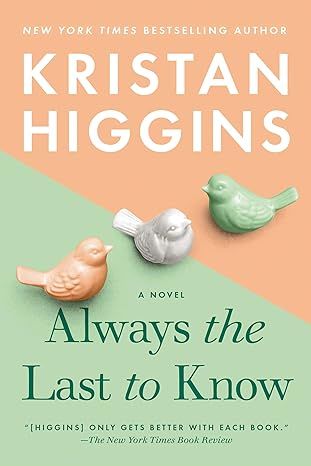
Always the Last to Know
4.5
-
3,220
$7.57
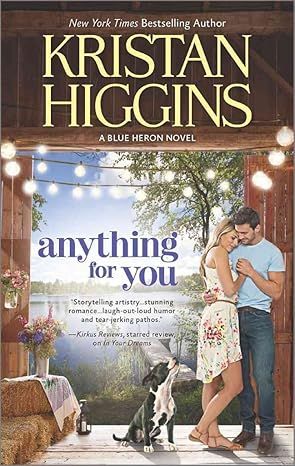
Anything for You (The Blue Heron Series Book 5)
4.5
-
3,348
$9.99

Somebody to Love (Gideon's Cove Book 3)
4.5
-
1,459
$7.99
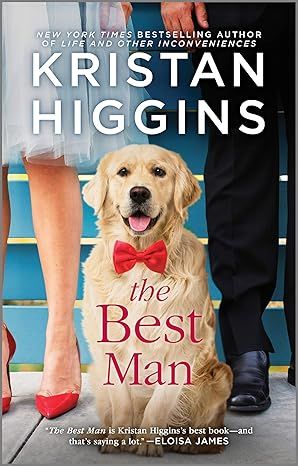
The Best Man (The Blue Heron Series Book 1)
4.4
-
3,434
$4.09
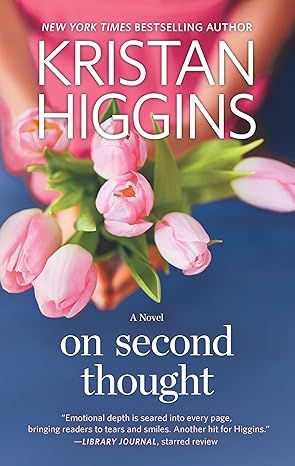
On Second Thought: A Novel
4.5
-
5,734
$6.11
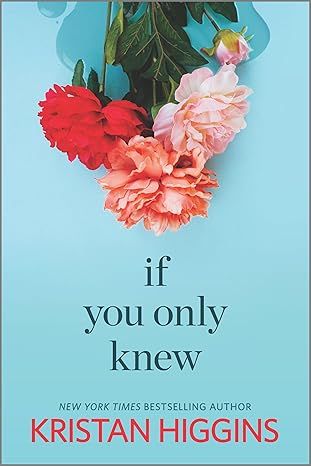
If You Only Knew
4.4
-
6,668
$7.99
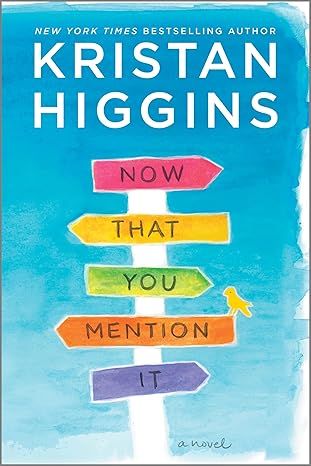
Now That You Mention It: A Novel
4.5
-
8,606
$7.45
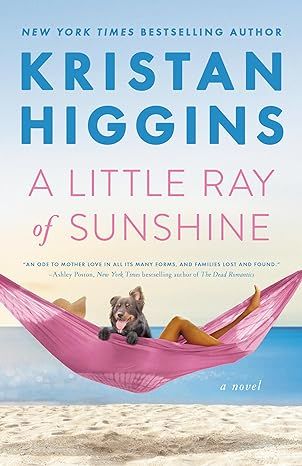
A Little Ray of Sunshine
4.6
-
3,319
$0.99
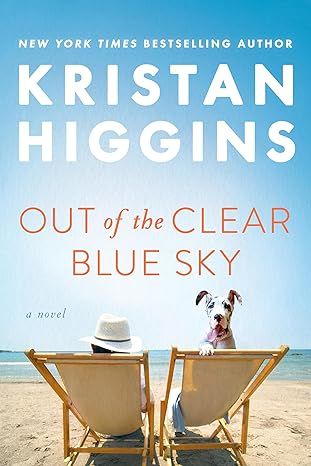
Out of the Clear Blue Sky
4.6
-
6,488
$5.99
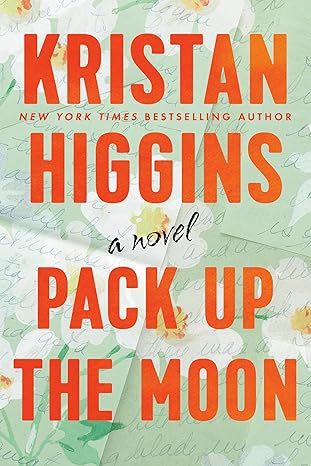
Pack Up the Moon
4.5
-
5,862
$7.99
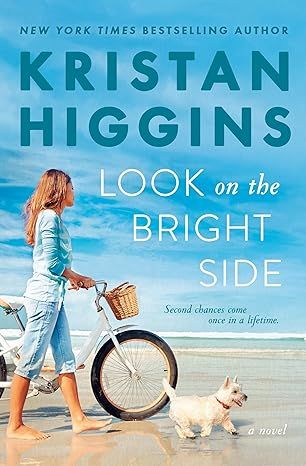
Look on the Bright Side
4.6
-
2,430
$0.99
Similar Books
Best sellers
View all
The Tuscan Child
4.2
-
100,022
$8.39

The Thursday Murder Club: A Novel (A Thursday Murder Club Mystery)
4.3
-
155,575
$6.33

Sapiens: A Brief History of Humankind
4.6
-
140,302
$13.49

The Butterfly Garden (The Collector, 1)
4.3
-
88,556
$9.59

Things We Hide from the Light (Knockemout Series, 2)
4.4
-
94,890
$11.66

The Last Thing He Told Me: A Novel
4.3
-
154,085
$2.99

The Perfect Marriage: A Completely Gripping Psychological Suspense
4.3
-
143,196
$9.47

The Coworker
4.1
-
80,003
$13.48

First Lie Wins: A Novel (Random House Large Print)
4.3
-
54,062
$14.99

Mile High (Windy City Series Book 1)
4.4
-
59,745
$16.19

Layla
4.2
-
107,613
$8.99

The Locked Door
4.4
-
94,673
$8.53
